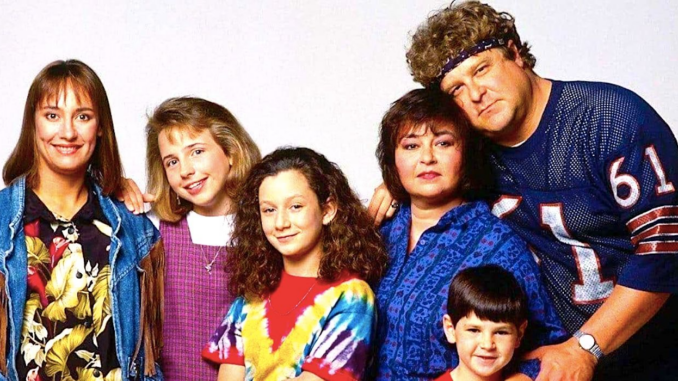
Introduction: The Surprise Return of the Conners
In 2018, Roseanne made an unexpected return to television, much to the delight (and surprise) of fans. After more than two decades since the show’s original run ended in 1997, Roseanne Barr and the beloved Conner family were back in primetime. The reboot of the show took the world by storm, drawing millions of viewers for its premiere. But what made this return so irresistible—and so controversial—at the same time?
With the political climate in the U.S. shifting dramatically, Roseanne‘s return was more than just a nostalgic trip down memory lane. It was an attempt to capture the pulse of a divided America, balancing humor with real-world issues. But despite its initial success, the revival quickly became mired in scandal, leading to a dramatic and swift cancellation. In this article, we’ll take a closer look at the reboot’s unique appeal, the controversies that surrounded it, and the reasons why fans were drawn back to the Conner family once more.
The Return of Roseanne: Was It Too Much, Too Soon?
The decision to bring back Roseanne in 2018 was a bold move. The show had concluded over two decades earlier, and many wondered if the Conner family’s brand of humor and social commentary could resonate with today’s audience. Yet, in the early episodes of the reboot, Roseanne proved that it still had a place in the modern television landscape.
The success of the revival hinged on its familiar formula—quippy humor, family drama, and social commentary. But the reboot also updated the show to reflect contemporary realities, with Roseanne and Dan Conner grappling with issues like healthcare, economic instability, and, most notably, political division. The show’s handling of these real-world issues contributed to its relevance, even as it kept the Conner family’s heart intact.
Yet, the reboot didn’t come without its challenges. The depiction of Roseanne Conner’s political views, which aligned with former U.S. President Donald Trump, sparked heated debates among viewers. Fans were split on whether the show’s portrayal of a working-class, conservative family was an accurate representation of modern America, or if it was an attempt to exploit political division for ratings.
The New Challenges and Modern Issues Addressed
The reboot wasn’t afraid to delve into current issues headfirst. The show explored political polarization, economic struggles, and health concerns—issues that felt more timely than ever before. Roseanne Conner, a vocal Trump supporter in the revival, was portrayed as unapologetic about her views, leading to some tension between her and her family members, who held different opinions.
The political subtext was impossible to ignore. While some appreciated the show’s honest depiction of a family divided by politics, others criticized it for focusing too heavily on real-world political issues. The show wasn’t shy about engaging in the culture wars, and it seemed to purposefully toe the line between entertainment and social commentary.
Additionally, the reboot also explored modern-day issues such as the opioid crisis, a problem that deeply impacted working-class communities. Roseanne’s character was shown struggling with the idea of dealing with a family member’s addiction, mirroring the tough choices many American families face today. These storylines presented a stark contrast to the more lighthearted episodes of the original series, but they allowed the reboot to maintain the show’s core value: addressing real-life struggles with humor and authenticity.
Controversies and Cancellations: A Rocky Road
Despite the initial success of the Roseanne reboot, the show was plagued by controversy. In May 2018, just weeks after the show’s successful premiere, Roseanne Barr made headlines for a series of racist tweets directed at Valerie Jarrett, an African American former senior advisor to President Obama. The backlash was swift and severe. The network, ABC, was forced to cancel the show within hours of the tweet being posted, resulting in a major shakeup for the Conner family.
The cancellation left many fans devastated and confused. They had invested in the show’s return, only to see it abruptly come to an end due to Barr’s actions. ABC ultimately replaced Roseanne with a spin-off series, The Conners, which focused on the remaining members of the Conner family. While The Conners continued the story, many fans felt the absence of Roseanne Conner was keenly felt, as her absence from the family dynamic altered the show’s tone.
The scandal surrounding Barr’s tweet cast a shadow over the legacy of Roseanne, but the reboot’s success—even if short-lived—demonstrated that the show’s unique blend of humor, family struggles, and real-world issues still had an audience. The show’s cancellation may have been controversial, but it underscored how the entertainment world had to grapple with the intersection of politics, personal behavior, and public image.

Conclusion: A Legacy of Unfinished Business
While the reboot of Roseanne may have been cut short, its influence on the television landscape cannot be denied. It showed that a family-centered sitcom could tackle hard-hitting, contemporary issues and remain relevant in today’s world. Despite its controversial ending, the revival proved there was still an appetite for Roseanne Conner’s unapologetic humor and the show’s unfiltered depiction of middle-class America.
Whether you loved it or hated it, the Roseanne reboot left its mark on TV. It sparked conversations, broke barriers, and, for a short time, reignited the magic of the Conner family. The reboot’s impact may have been fleeting, but its legacy will live on.
